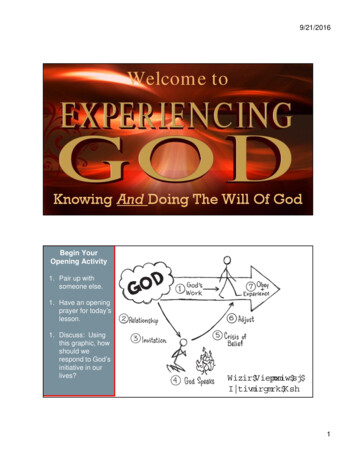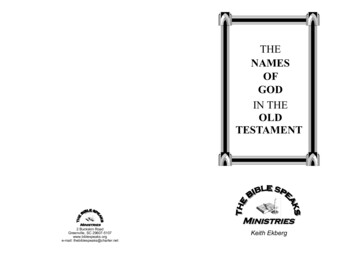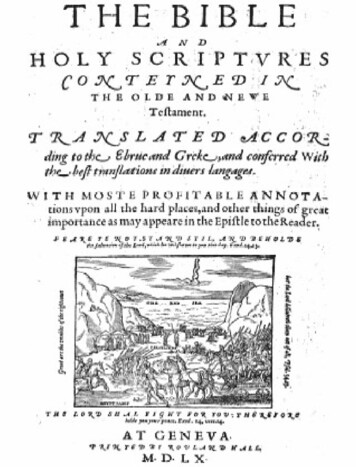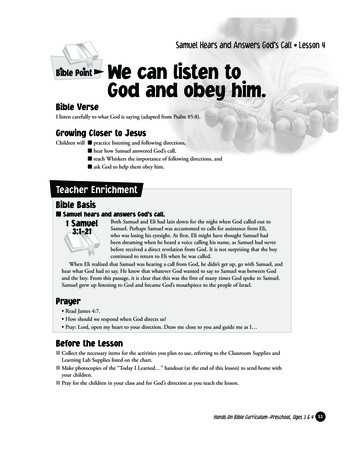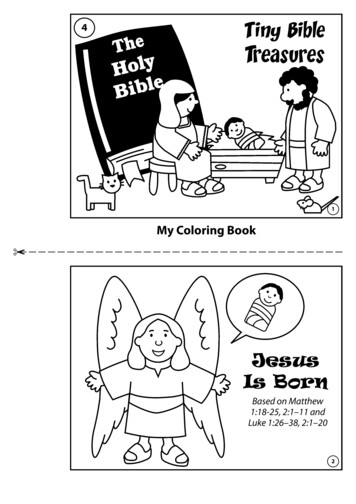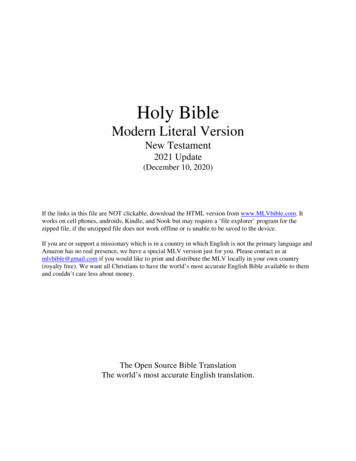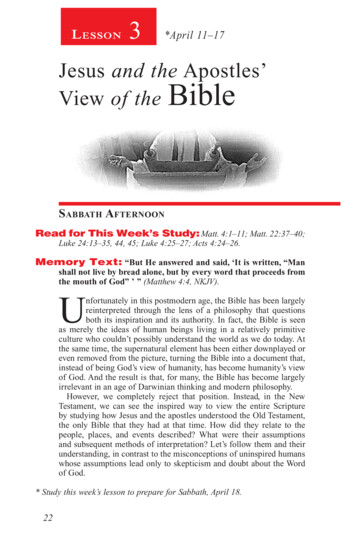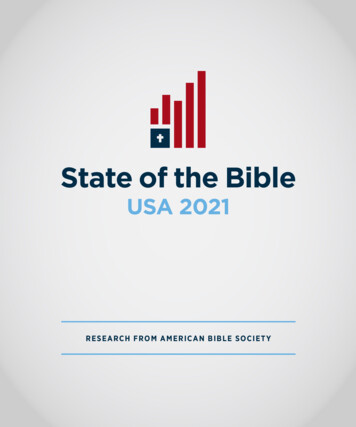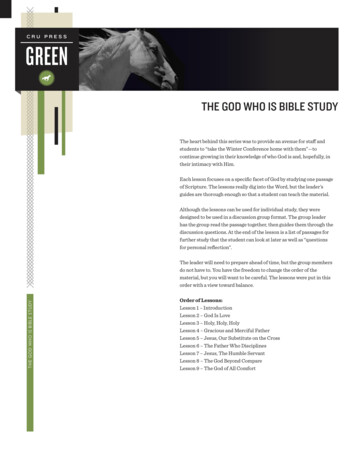
Transcription
THE GOD WHO IS BIBLE STUDYThe heart behind this series was to provide an avenue for staff andstudents to “take the Winter Conference home with them”—tocontinue growing in their knowledge of who God is and, hopefully, intheir intimacy with Him.Each lesson focuses on a specific facet of God by studying one passageof Scripture. The lessons really dig into the Word, but the leader’sguides are thorough enough so that a student can teach the material.Although the lessons can be used for individual study, they weredesigned to be used in a discussion group format. The group leaderhas the group read the passage together, then guides them through thediscussion questions. At the end of the lesson is a list of passages forfurther study that the student can look at later as well as “questionsfor personal reflection”.THEI N VESG TIODG ATW HOIV E I BS IBB IBL EL ES TUS TDYU DY1The leader will need to prepare ahead of time, but the group membersdo not have to. You have the freedom to change the order of thematerial, but you will want to be careful. The lessons were put in thisorder with a view toward balance.Order of Lessons:Lesson 1 – IntroductionLesson 2 – God Is LoveLesson 3 – Holy, Holy, HolyLesson 4 – Gracious and Merciful FatherLesson 5 – Jesus, Our Substitute on the CrossLesson 6 – The Father Who DisciplinesLesson 7 – Jesus, The Humble ServantLesson 8 – The God Beyond CompareLesson 9 – The God of All Comfort
The God Who IsLeader’s GuideIntroductory LessonActs 17:16-34BackgroundThe book of Acts was written by a physician named Luke, probably around 60-62AD. Acts is an historical narrative, or story, that picks up where the Gospel of Lukeleaves off, and traces the rise and spread of the early Christian church. In Acts 17 wesee a snapshot of the life of the Apostle Paul. Paul had been a Jew who was so devout in his faith that he actually persecuted and killed Christians. But one day Jesus,who had already lived on earth, been crucified and resurrected, appeared to Paul inperson while Paul was walking down the road (see Acts 9). The encounter was sopowerful that Paul became not only a Christian, but also the greatest Christian missionary who has ever lived. Luke was a close friend of Paul’s who often traveled onhis missionary trips with him. The events of Acts 17 take place in Athens, Greece,the intellectual capital of the world at the time.Read Acts 17:1617:16-34In this passage, Paul stands up in the meeting of the Areopagus and makes known the “unknowngod”. What facts does he emphasize about God in vv. 24-27?v.24 God created the whole worldv.24 He is the Lord, or Ruler, of Heaven and Earthv.25 He doesn’t need anything we, as humans, can give Himv.25 He is the source of all lifev.26 He determined exactly when and where every person would livev.27 God desires people to seek Himv.27 He is not far from us**Ask the members of your group which of these is most meaningful to themandwhy.Notice how many times Paul uses words like “all”, “every” and “everything”. What do youthink is the significance of this?How does God make Himself known today?The key answer here that we want to get across is “from His word, the Bible”—but hedoes also make Himself known through nature, and expresses Himself through the livesof Spirit-filled ChristiansPaul’s statements certainly challenged the Athenians’ view of God. (Some further background:the Epicureans’ main goal in life was seeking pleasure, and the Stoics emphasized rationalthought and self-sufficiency.) How does the Bible, particularly the above passage, challenge today’s misconceptions about God?The whole issue of creationism—People think they run their own lives and don’t have toanswer to anyone—Many think that God doesn’t really care about the day in/day out ofour lives—He seems distant—Humanistic thought (that man is the highest being)—etc. 2001 Campus Crusade for Christ,Inc. Permission granted to copy forpersonal or ministry uses, providedthis credit line is included and content remains unchanged.In vv. 29-31, Paul was obviously concerned that people would not worship idols, but insteadworship the one true God, “the God who is”. Today in America, we wouldn’t usually form idolsout of “gold or silver or stone” (v.29), but we can still worship other people or things above God.What are some of the things we “idolize” above God?
The God Who IsIntroductory LessonActs 17:16-34BackgroundThe book of Acts was written by a physician named Luke, probably around 60-62AD. Acts is an historical narrative, or story, that picks up where the Gospel of Lukeleaves off, and traces the rise and spread of the early Christian church. In Acts 17 wesee a snapshot of the life of the Apostle Paul. Paul had been a Jew who was so devout in his faith that he actually persecuted and killed Christians. But one day Jesus,who had already lived on earth, been crucified and resurrected, appeared to Paul inperson while Paul was walking down the road (see Acts 9). The encounter was sopowerful that Paul became not only a Christian, but also the greatest Christian missionary who has ever lived. Luke was a close friend of Paul’s who often traveled onhis missionary trips with him. The events of Acts 17 take place in Athens, Greece,the intellectual capital of the world at the time.Read Acts 17:1617:16-34.In this passage, Paul stands up in the meeting of the Areopagus and makes known the “unknowngod”. What facts does he emphasize about God in vv. 24-27?Notice how many times Paul uses words like “all”, “every” and “everything”. What do youthink is the significance of this?How does God make Himself known today?Paul’s statements certainly challenged the Athenians’ view of God. (Some further background:the Epicureans’ main goal in life was seeking pleasure, and the Stoics emphasized rationalthought and self-sufficiency.) How does the Bible, particularly the above passage, challenge today’s misconceptions about God? 2001Campus Crusade for Christ, Inc.Permission granted to copy forpersonal or ministry uses, provided this credit line is includedand content remains unchanged.In vv. 29-31, Paul was obviously concerned that people would not worship idols, but insteadworship the one true God, “the God who is”. Today in America, we wouldn’t usually form idolsout of “gold or silver or stone” (v.29), but we can still worship other people or things above God.What are some of the things we “idolize” above God?
The God Who IsIntroductory Lesson– page 2Acts 17:16-34Paul explains that God doesn’t want people to worship idols, but instead “He commands all people to repent” (v. 30). What does the word “repent” mean?Who is “the man” that Paul writes about in v. 31?How does it make you feel that one day God will “judge the world with justice” (v.31)? WhenGod judges you, will you be declared “guilty” or “innocent”?We learn from other passages in the Bible (Romans 3:21-26; Hebrews 9:26-28) that Jesus is notonly the man who will justly judge us as “guilty”, but He will also serve our sentence (of death)in our place if we will only trust in Him. How does that make you feel?Passages ForFurther Study:Job 38-41Colossians 1:13-23John 1:1-5Hebrews 9:26-28Romans 3:21-26; 5:6-8Questions For Personal Reflection:1. Reread Acts 17:32-34. When you hear about the resurrection of Jesus, are you:1) One who sneers?2) One who wants to hear more on the subject?3) One who believes and follows?4)2. Are you trusting in yourself to be declared “innocent” when God judges you, or are you trusting in Jesus Christ to be your substitute?3. What do you need to repent of? Is there sin in your life you need to turn from?4. Do you know God well enough that if the “leading philosophers” of our day—say, your professors--asked you to explain Him, you could?5. What can you do this week to get to know “the God who is” better?6. Go back this week and look at Acts 17:24-27 and reflect on “the God who is”. 2001Campus Crusade for Christ, Inc.Permission granted to copy forpersonal or ministry uses, provided this credit line is includedand content remains unchanged.“There is a God we want, and there is a God who is—and theyare not the same God.The turning point of our lives is when we stop seeking theGod we want and start seeking the God who is.”
The God Who IsLeader’s GuideIntroductory Lesson– page 2Acts 17:16-34Paul explains that God doesn’t want people to worship idols, but instead “He commands all people to repent” (v. 30). What does the word “repent” mean?Some dictionary definitions: “to feel regretful for past conduct”, “to turn from sin anddedicate oneself to the amendment of one’s life”, “to change one’s mind”It’s the idea that where we once thought that WE were right, we now see that GOD wasright and we were wrong.Who is “the man” that Paul writes about in v. 31?Jesus ChristHow does it make you feel that one day God will “judge the world with justice” (v.31)? WhenGod judges you, will you be declared “guilty” or “innocent”?We learn from other passages in the Bible (Romans 3:21-26; Hebrews 9:26-28) that Jesus is notonly the man who will justly judge us as “guilty”, but He will also serve our sentence (of death)in our place if we will only trust in Him. How does that make you feel?The main point that we want to get across here is that God has to be totally JUST (andwe’re guilty sinners deserving punishment), and so it wouldn’t be right for Him to just“let us off the hook”. But because He is also totally LOVING, He sent His Son Jesus toserve our punishment for us. This way God doesn’t have to be a wimp, but He can beloving at the same time.Passages ForFurther Study:Job 38-41Colossians 1:13-23John 1:1-5Hebrews 9:26-28Romans 3:21-26; 5:6-8**The end of this lesson has probably focused more on God’s JUSTICE, but we wanteveryone one to know God is LOVE, too. Let everyone know that next week we’ll befocusing in on God’s LOVE.**Also explain to them that the passages in the right column and the questions beloware for their own personal study to get to know God better (especially some of the aspects of Him we looked at today).Questions For Personal Reflection:1. Reread Acts 17:32-34. When you hear about the resurrection of Jesus, are you:1) One who sneers?2) One who wants to hear more on the subject?3) One who believes and follows?4)2. Are you trusting in yourself to be declared “innocent” when God judges you, or are you trusting in Jesus Christ to be your substitute?3. What do you need to repent of? Is there sin in your life you need to turn from?4. Do you know God well enough that if the “leading philosophers” of our day—say, your professors--asked you to explain Him, you could? 2001 Campus Crusade for Christ,Inc. Permission granted to copy forpersonal or ministry uses, providedthis credit line is included and content remains unchanged.5. What can you do this week to get to know “the God who is” better?6. Go back this week and look at Acts 17:24-27 and reflect on “the God who is”.
The God Who IsLeader’s GuideGod Is Love1 John 4:7-21BackgroundI John is a letter written by the Apostle John, who was a fisherman before he becameone of Jesus’ 12 disciples. He was actually Jesus’ closest friend when He lived onearth, and is sometimes referred to in the Bible as “the disciple whom Jesus loved”.We don’t know exactly to whom John was writing this letter to, or much about them,except that they were Christians. It is also difficult to know exactly when John wrotethe letter—although most scholars agree it was written in the second half of the firstcentury AD. However, the truths of the letter are timeless, and applicable to all believers of all times. John also wrote the Gospel of John, 2 John, 3 John, and theBook of Revelation.Why do you think the topic of love dominates music, movies, books and magazines, and so manyother aspects of our lives?Love is a basic need all humans have—God created us that way!Blaise Pascal, the famous French mathematician and philosopher, once said, “There is a Godshaped vacuum inside the heart of every man, that can only be filled by the person of JesusChrist”. What are some of the things we try to use to fill the “God-shaped” hole in our lives?Read I John 4:74:7-21In v.14, John writes that, “The Father has sent His Son to be the savior of the world”. What is itthat we need to be saved from?Technically, the answer is that we need to be saved from God’s wrath, which He rightfully should pour out on us because of our sin. But many people might answer “fromour sins” or “from ourselves”, which is on the right train of thought.WORD STUDY: Love (or “agape” in the original Greek language):This word appears 29 times in the above passage (words like “dear children” are actually “lovedones”). Agape “expresses the deep and constant love and interest of a perfect Being towardsentirely unworthy objects It is an exercise of the divine will in deliberate choice, made withoutassignable cause save that which lies in the nature of God Himself”. It is the key, defining wordused to characterize God both in the Old and New Testament. It is contrasted with other Greekwords for love, such as “phileo” (tender affection/brotherly love) and “eros” (sexual love). Insummary, it is a complete, unconditional, pure, sacrificial love. (From Vine’s Expository Dictionary)What do vv.9-10 say is the way God “showed” or “proved” His love for us?By sending His Son to die on the cross to save us (from God’s wrath), and so that wemight live 2001Campus Crusade for Christ, Inc.Permission granted to copy forpersonal or ministry uses, provided this credit line is includedand content remains unchanged.What does “atoning sacrifice” (or “propitiation”) mean (v.10)?The answer is "satisfaction".**Ask them "What needs to be satisfied?" Answer: the sentence of punishment (God's wrath) forour sins
The God Who IsLeader’s GuideGod Is Love – page 21 John 4:7-21Why does God love us?Because that is who He is. He IS love—He would have to go against His very nature toNOT love us. The fact that He loves us has NOTHING to do with anything we havebeen or done, and EVERYTHING to do with who God isIs there anything you can do to make God love you less than He does now? Is there anythingyou can do to make God love you more than He does now? How does that make you feel?NO!! Again, God’s love is totally dependent on His character, not on our actionsWhen is it hardest to believe that God loves you?Possible responses might include 1)”When I fail or sin”, or 2)”When I am goingthrough a hard time”We use the phrase, “Like father, like son” to describe the fact that children often resemble theirparents. How does this principle relate to those who claim to be God’s children (vv.7-8,11-12,20-21)?If God lives in us, He should be able to express His love through us to others. Weshould be loving in an agape way.How does our love for each other make the invisible God visible?God can, in a way, be “seen” through our tangible, loving actions toward othersPassages ForFurther Study:If someone isn’t loving, does that mean they’re not a Christian?No, not necessarily. What v.8 says is that if someone doesn’t love, they don’t knowGod—the solution is for that person to get to know God better—to have a greater revelation of God’s love for themIn what ways, large or small, can we sacrificially love each other?Psalm 136John 15:9-13Romans 5:5-8;8:31-39I Corinthians 13Ephesians 2:1-5Questions for personal reflectionreflection1.Pray the prayer from Ephesians 3:16-19 for your prayer partner for this week.2.Is there someone whom you have a hard time loving? Pray and ask God to reveal His lovemore fully for you—and then see if this changes your feelings for the other person. Acknowledge to God that you don’t have the ability, in your own power, to love them, and askGod to love them “through” you.3. Go back, look at the passage again, and reflect on all the different aspects of God we looked.What part of God’s character means the most to you? Meditate on that, and maybe even memorize one of the verses that talk about it. 2001Campus Crusade for Christ, Inc.Permission granted to copy forpersonal or ministry uses, provided this credit line is includedand content remains unchanged.“There is a God we want, and there is a God who is—and theyare not the same God.The turning point of our lives is when we stop seeking theGod we want and start seeking the God who is.”
The God Who IsGod Is Love1 John 4:7-21BackgroundI John is a letter written by the Apostle John, who was a fisherman before he becameone of Jesus’ 12 disciples. He was actually Jesus’ closest friend when He lived onearth, and is sometimes referred to in the Bible as “the disciple whom Jesus loved”.We don’t know exactly to whom John was writing this letter to, or much about them,except that they were Christians. It is also difficult to know exactly when John wrotethe letter—although most scholars agree it was written in the second half of the firstcentury AD. However, the truths of the letter are timeless, and applicable to all believers of all times. John also wrote the Gospel of John, 2 John, 3 John, and theBook of Revelation.Why do you think the topic of love dominates music, movies, books and magazines, and so manyother aspects of our lives?Blaise Pascal, the famous French mathematician and philosopher, once said, “There is a Godshaped vacuum inside the heart of every man, that can only be filled by the person of JesusChrist”. What are some of the things we try to use to fill the “God-shaped” hole in our lives?Read I John 4:74:7-21In v.14, John writes that, “The Father has sent His Son to be the savior of the world”. What is itthat we need to be saved from?WORD STUDY: Love (or “agape” in the original Greek language):This word appears 29 times in the above passage (words like “dear children” are actually “lovedones”). Agape “expresses the deep and constant love and interest of a perfect Being towardsentirely unworthy objects It is an exercise of the divine will in deliberate choice, made withoutassignable cause save that which lies in the nature of God Himself”. It is the key, defining wordused to characterize God both in the Old and New Testament. It is contrasted with other Greekwords for love, such as “phileo” (tender affection/brotherly love) and “eros” (sexual love). Insummary, it is a complete, unconditional, pure, sacrificial love. (From Vine’s Expository Dictionary)What do vv.9-10 say is the way God “showed” or “proved” His love for us? 2001Campus Crusade for Christ, Inc.Permission granted to copy forpersonal or ministry uses, provided this credit line is includedand content remains unchanged.What does “atoning sacrifice” (or “propitiation”) mean (v.10)?
The God Who IsGod Is Love – page 21 John 4:7-21Why does God love us?Is there anything you can do to make God love you less than He does now? Is there anythingyou can do to make God love you more than He does now? How does that make you feel?When is it hardest to believe that God loves you?We use the phrase, “Like father, like son” to describe the fact that children often resemble theirparents. How does this principle relate to those who claim to be God’s children (vv.7-8,11-12,20-21)?How does our love for each other make the invisible God visible?If someone isn’t loving, does that mean they’re not a Christian?Passages ForFurther Study:Psalm 136John 15:9-13Romans 5:5-8;8:31-39I Corinthians 13Ephesians 2:1-5In what ways, large or small, can we sacrificially love each other?Questions for personal reflection1.Pray the prayer from Ephesians 3:16-19 for your prayer partner for this week.2.Is there someone whom you have a hard time loving? Pray and ask God to reveal His lovemore fully for you—and then see if this changes your feelings for the other person. Acknowledge to God that you don’t have the ability, in your own power, to love them, and askGod to love them “through” you.3. Go back, look at the passage again, and reflect on all the different aspects of God we looked.What part of God’s character means the most to you? Meditate on that, and maybe even memorize one of the verses that talk about it. 2001Campus Crusade for Christ, Inc.Permission granted to copy forpersonal or ministry uses, provided this credit line is includedand content remains unchanged.“There is a God we want, and there is a God who is—and theyare not the same God.The turning point of our lives is when we stop seeking theGod we want and start seeking the God who is.”
The God Who IsLeader’s GuideHoly, Holy, HolyIsaiah 6:1-8BackgroundThe book of Isaiah is named after its author, Isaiah, a prophet to the Jewish people, inthe time before and after 700 BC. During this period, Israel was in a time of greatpolitical struggle and spiritual decline. Isaiah’s book has more prophetic referencesto the coming Savior, Jesus, than any other Old Testament book, and he is theprophet most quoted by Jesus in the New Testament. Fittingly, his name means,“Yahweh is salvation”. We are not sure how Isaiah died, but tradition has it that hewas sawed in two inside a hollow log for his faith. Chapter six tells of an experienceRead Isaiah 6:16:1-8Now go back and see what we learn about God in each of the following verses:v.1-called “Lord” (what is a “lord”?)-seated on a throne-He is high and exalted-the train of His robe fills the templeAsk: “What kind of picture is this? If you had to pick one word todescribe God from this verse, what would it be?”Answer: a king!v.2-seraphs flying around above Him***seraphs are a type of angel—their name literally means“burning ones”v.3-4-seraphs sing to each other about Him-He is holy! (the repetition of the word 3 times denotes the supremacy & completeness of His holiness)-He is Almighty (Hebrew “El Shaddai”—the mightiest God)-the whole earth is full of His gloryWORD STUDY: Holy (or “qados” in the original Hebrew language):The word “holy” means “separated”, and is used here (and in many other places in Scripture) tosignify the complete “separateness” or “otherness” of God—there is no one like Him. He is absolute in His purity, majesty, and glory. Webster’s Dictionary defines holy as, “exalted or worthy of complete devotion as one perfect in goodness and righteousness”.Being in the presence of God made Isaiah very aware of his own sinfulness, as well as the sins ofhis country. How does God make us aware of our sin today?It is the same process: by revealing Himself, we automatically see how we come upshort! He reveals Himself through the Holy Spirit, who lives inside each believer,through the Bible, through His holy presence in other Godly believers, and throughprayer. 2001Campus Crusade for Christ, Inc.Permission granted to copy forpersonal or ministry uses, provided this credit line is includedand content remains unchanged.What kinds of things dull our spiritual senses and harden our hearts so that we become comfortable with or complacent about sin?Lack of time in the Word; too much time “taking in the world” through TV, music,reading; not being around other godly Christians who challenge us; comparing ourselves to others instead of to God; pride, etc.
The God Who IsLeader’s GuideHoly, Holy, Holy —page 2Isaiah 6:1-8Notice that Isaiah doesn’t make any excuses for his sin—he just confesses it. What Does God doin response (v.5-7)?He cleanses his sin by having a seraph put a coal on his lips. A burning coal was a partof the Old Testament temple sacrifices. Isaiah would have recognized this as a symbolof the full ritual of cleansing from sin.How does God “take our guilt away” and “atone” for our sin today?***Have them recall last week’s study, where we discussed that Jesus was the “atoningsacrifice” who cleansed us once and for all. We are cleansed from our sins when wetrust that Jesus has paid for them.What is the next thing God does after He cleanses Isaiah’s sin?He asks for volunteers to “go”. What He was looking for exactly is explained further inchapter 6.What was Isaiah’s response (v.8)?He is so excited! He wants to go!Notice again that there are no excuses or delays in Isaiah’s response. What aspect of God do youthink Isaiah had seen that caused him to respond so quickly and absolutely to God call?The complete rule, majesty, and authority of God the King—and the total honor it is toserve HimPassages ForFurther Study:Ezekiel 1-2Psalm 40Psalm 99Revelation 4-5***End by asking, “How many of you want to be used by God?” Assuming that mostor all of them want to, point out what we’ve learned from this passage that will makethem prepared to be used. First we have to know God—to see Him as He really is:holy, holy, holy. Next we have to be cleansed from all sin. Then we have to be willingto go wherever God sends us, right when He calls us. That’s how we can experience theincredible fulfillment of being used by God!Questions for personal reflection1. How does God’s holiness affect your life?2. What can you do this week to become more aware of God’s holiness?3. Where, or to whom, is God asking you to go to now? Is there a friend or family member youneed to tell about Jesus? What ministry is He calling you to this semester? This summer? Afteryou graduate? Are you willing to say, “Here am I, send me!”? 2001Campus Crusade for Christ, Inc.Permission granted to copy forpersonal or ministry uses, provided this credit line is includedand content remains unchanged.“There is a God we want, and there is a God who is—and theyare not the same God.The turning point of our lives is when we stop seeking theGod we want and start seeking the God who is.”
The God Who IsHoly, Holy, HolyIsaiah 6:1-8BackgroundThe book of Isaiah is named after its author, Isaiah, a prophet to the Jewish people, inthe time before and after 700 BC. During this period, Israel was in a time of greatpolitical struggle and spiritual decline. Isaiah’s book has more prophetic referencesto the coming Savior, Jesus, than any other Old Testament book, and he is theprophet most quoted by Jesus in the New Testament. Fittingly, his name means,“Yahweh is salvation”. We are not sure how Isaiah died, but tradition has it that hewas sawed in two inside a hollow log for his faith. Chapter six tells of an experienceRead Isaiah 6:16:1-8Now go back and see what we learn about God in each of the following verses:v.1v.2v.3-4WORD STUDY: Holy (or “qados” in the original Hebrew language):The word “holy” means “separated”, and is used here (and in many other places in Scripture) tosignify the complete “separateness” or “otherness” of God—there is no one like Him. He is absolute in His purity, majesty, and glory. Webster’s Dictionary defines holy as, “exalted or worthy of complete devotion as one perfect in goodness and righteousness”.Being in the presence of God made Isaiah very aware of his own sinfulness, as well as the sins ofhis country. How does God make us aware of our sin today?What kinds of things dull our spiritual senses and harden our hearts so that we become comfortable with or complacent about sin?Notice that Isaiah doesn’t make any excuses for his sin—he just confesses it. What Does God doin response (v.5-7)? 2001Campus Crusade for Christ, Inc.Permission granted to copy forpersonal or ministry uses, provided this credit line is includedand content remains unchanged.How does God “take our guilt away” and “atone” for our sin today?
The God Who IsHoly, Holy, Holy —page 2Isaiah 6:1-8What is the next thing God does after He cleanses Isaiah’s sin?What was Isaiah’s response (v.8)?Notice again that there are no excuses or delays in Isaiah’s response. What aspect of God do youthink Isaiah had seen that caused him to respond so quickly and absolutely to God call?Questions for personal reflection1. How does God’s holiness affect your life?Passages ForFurther Study:2. What can you do this week to become more aware of God’s holiness?Ezekiel 1-2Psalm 40Psalm 99Revelation 4-53. Where, or to whom, is God asking you to go to now? Is there a friend or family member youneed to tell about Jesus? What ministry is He calling you to this semester? This summer? Afteryou graduate? Are you willing to say, “Here am I, send me!”? 2001Campus Crusade for Christ, Inc.Permission granted to copy forpersonal or ministry uses, provided this credit line is includedand content remains unchanged.“There is a God we want, and there is a God who is—and theyare not the same God.The turning point of our lives is when we stop seeking theGod we want and start seeking the God who is.”
The God Who IsLeader’s GuideGracious and Merciful FatherEphesians 2:1-10BackgroundEphesians is a letter written by the Apostle Paul to the church located in thecity of Ephesus. We learned previously that Paul was a devout Jew until Godconverted him into the greatest Christian missionary in all of time. Paulhelped establish the church in Ephesus while he was on one of his missionarytrips. Ephesus was a leading city in the Roman Empire, and is located in present day Turkey. Paul writes this letter while he is in another city serving aprison sentence for sharing the gospel, in or around the year 60 AD. Manyscholars also believe that Ephesians was a "cyclical letter”, sent on to otherchurches in the area for their instruction.Read Ephesians 2:12:1-10.What things were true of us before we became Christians (vv.1-3)?v.1 We were dead (spiritually) in our sinsv.2 We followed the world and Satan (he’s who “the ruler of the kingdom of the air” is)v.3 We gratified the cravings of our flesh—we had no other choice than to live out ofselfishnessv.3 Because of who we were (sinners) in our very make-up, we were deserving of God’swrath**In summary, we were dead, ruled by Satan, slaves to our sinful nature, and God’swrath was upon us—we were in a very bad way!After outlining how gross we were in vv.1-3, Paul begins v.4 with the contrast, “But God ”What three aspects of God’s character do we learn about in v.4?He has great love for us, is rich in mercy, and is full of grace. Explain that we lookedclosely at “love” two weeks ago, so this week we’ll be looking at “merc
5. What can you do this week to get to know “the God who is” better? 6. Go back this week and look at Acts 17:24-27 and reflect on “the God who is”. “There is a God we want, and there is a God who is—and they are not the same God. The turning point of our lives is when we stop seeking the God we want and start

